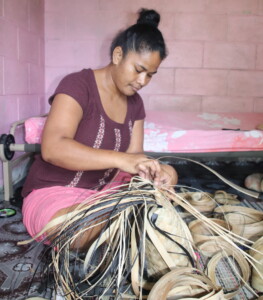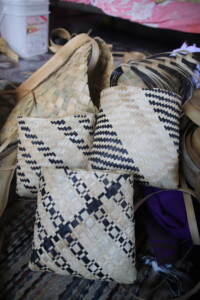Ledua sells her crafts on social media
December 6, 2020
By Erica Lee
 Last year Ledua Lauti learnt to use social media to market her crafts and today she has a thriving handicraft micro business that she operates from her home.
Last year Ledua Lauti learnt to use social media to market her crafts and today she has a thriving handicraft micro business that she operates from her home.
The 37-year-old artisan and mother of three is a member of the Deaf Association of Fiji (DAF).
Born in a family of 12 children, she and three of her siblings had been born deaf. Their parents both worked in the tourism industry – her father was a singer/entertainer and part-time carver and her mother made handicrafts for the tourists. With both parents being skilled artisans, it was not long before Ledua also picked up skills in weaving and at the age of 12, she began helping her parents to make and sell their crafts at hotels on the coral coast in Fiji.
Selling her crafts on Facebook
As an adult, it wasn’t until last year that Ledua began to actively sell her crafts. She had heard from two other members of DAF that they were earning money by selling homemade jams and sewing clothes, which they marketed on social media. Ledua said she was interested to do the same and asked one of the members to teach her how to use Facebook effectively.
Through a sign interpreter, Ledua informs us that she weaves baskets, mats, salusalu (traditional lei made from natural fibres) and bible cases, and she also makes doormats and jewellery. She sources raw vou from her own small pandanus plants she has growing outside her flat. Sometimes her husband, who works at a car wash at the Fiji National Council for Disabled Peoples, also purchases voivoi from the Suva market and from his village in Ra. For her door mats, Ledua collects scrap fabric from a garment factory in Kalabu, which she knots together to make door mats.
In a week, Ledua can make 20 to 40 baskets of various sizes. The baskets range in price from $10 to $40 and in a week, depending on sales, she can make between $100 to $200. When she has made enough items, she takes pictures and posts them on her personal Facebook profile. Vendors from the Suva handicraft market and other individual buyers then contact her on Facebook Messenger to place their orders. Sometimes Ledua is unable to keep up with the demand for her products, saying that when she posts up pictures, they can sell really quickly.
Globally, social media networks and online platforms have been used increasingly during the COVID-19 pandemic as many businesses are unable to open physical stores. Customers also preferring to shop online as it is more safer and convenient especially thanks to new easy digital payments platforms now available like Vodafone’s M-PAiSA. Using social media is an easy and cheaper means for micro enterprises to enter the world of business.
A 2019 study by Mastercard Foundation and Bankable Frontier Associates titled Digital Commerce and Youth Employment in Africa[1], coined the term iWorkers to describe individuals who use digital platforms like social media to buy and sell products. The report states that the arrival of digital connectivity has the potential to bridge the gap between the informal sector, helping more entrepreneurs to become more formalised. The report also highlighted that digital commerce offers great potential for young people in the future to easily access work and to sell their goods.
 The cost of doing business and COVID-19 challenges
The cost of doing business and COVID-19 challenges
Last year, Ledua received a small grant of $600 from the Ministry of Women, Children and Poverty Alleviation to help her start her business. She used this money to buy her initial raw materials. This money also helped her to sell and display her crafts at the 2019 Women’s Expo that was held at the National Gymnasium in Suva.
Currently, Ledua sells her wares from her one-bedroom flat that she rents at Nasole Housing Assistance Relief Trust (HART) – a charity providing low-cost housing for families and elderly couples. She and her husband (also deaf) pay about $10 a week in rent.
She said that when she first started her micro business, she was doing really well and was able to comfortably take care of her family. However, because of the COVID-19 pandemic and the resulting decline in tourism, she is making less this year compared with 2019.
Recalling the 2-week COVID-19 lockdown, Ledua said her sales dropped drastically and her family had to really budget their income. Her husband wasn’t able to work and so they had to rely on her earnings and also dip into their minimal savings.
As a stay-at-home mum, Ledua says that the movement restrictions didn’t really affect her as she is used to spending most of her time at home weaving and looking after her 4-year-old son.
‘My business has started to pick up again over the last couple of months. While I would like to grow my business and have a stall at the handicraft market, I still cannot afford the rent and other costs like transportation.’
Without collateral and an established credit rating, women like Ledua in the informal sector often find it difficult to take out loans to grow their business and many do not progress from being micro enterprises. This is where social media is providing an easy entry point to business and the only real business cost that she incurs is her weekly recharge cards for internet data.
Despite this, Ledua remains optimistic and when asked if she has faced any difficulties in running her business and coping with her disability, Ledua informs us proudly that she is very happy to be able to provide for her family. Though it’s not much, she said, she is content to use her abilities and skills to support her family.
If you are interested in purchasing some of Ledua’s amazing products, please contact her on Facebook.
[1] https://mastercardfdn.org/wp-content/uploads/2019/03/BFA_Digital-Commerce-White-Paper_FINAL_Feb-2019-aoda.pdf
Recent Whats New
A Safe Haven for Women
June 20 2025
Victoria Yee appointed as Executive Director
April 1 2025
Leading Gender-Based Violence Awareness in Vanua Levu
March 19 2025
From Hive to Harvest
March 16 2025
Ba Women’s Rugby: Growing Strength On and Off the Field
March 10 2025
